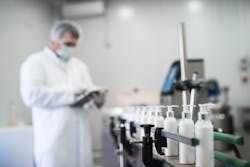Japanese chemical company Kao made its name in the late 19th century as Japan’s first domestic soap manufacturer. The company’s soap, named Kao Sekken, cleaned up despite the dominance of import soaps and eventually established a foothold in the Japanese consumer marketplace.
The success of Kao’s soap helped fuel the launch of the company’s other personal and home-care products, from moisturizers and shampoos to oils and detergents. Today, Kao is a leading chemical company that has expanded its reach far beyond Japan, with more than 33,000 global employees across its consolidated companies and more than $11 billion in annual net sales.
Among Kao’s global businesses is Quimikao, which was established near Guadalajara, Mexico, more than 35 years ago. Today Quimikao produces products for the North and South American, Asian and Australian markets. The company primarily produces cationic surfactant derivatives of fatty acids for use in a wide range of products, from fabric softeners and fragrance compounds to asphalt emulsifiers and corrosion inhibiters used in petroleum.
Quimikao recently decided to establish a new plant in Mexico to meet growing demand for nitrile, a chemical base for liquid detergents, fabric softeners and other products. Rather than designing the new facility from the ground up, Quimikao opted to replicate an existing Kao Japanese plant using locally sourced process automation controls and support services.
The new plant being established in Mexico required a distributed control system to operate the three primary chemical-processing areas used in nitrile production: the reaction system, distillation system and complementary services such as the supplying of fatty acids, and the steam generator system. The facility included a Class I Division 2 hazardous area, and required secure access and visibility into all aspects of processing.
The Japanese plant would serve as the basis for the Mexican plant, but an exact replication of the facility wasn’t an option. The Japanese plant was built around a control system from a Japanese solution provider that had minimal experience or presence in Mexico. Mexico-based systems integrator ORDI was tasked with designing and installing the automation control system in the new facility within a six-month project timeline.
“We met with an engineer of the original plant in Japan to discuss the system design that would be used for the new plant,” said Salvador Alejandro Rivas Rojas, a project manager for ORDI. “We needed to decide the best approach for meeting the requirements of the original facility while keeping the project on schedule. We couldn’t wait for equipment and component deliveries to come from Japan, and we wanted support services provided in the local language.”
ORDI, which specializes in automated facilities within the chemical industry, decided to utilize a North American-based equipment and solution provider that could help speed up the design, installation and commission processes in the new plant, and provide an intuitive and flexible system. It would also help eliminate the communication challenges that would otherwise arise between the on-site integrators in Mexico and a Japanese support staff.
ORDI chose to implement a virtualized PlantPAx® modern distributed control system (DCS) from Rockwell Automation. The PlantPAx system combines process and discrete control in one system, and provides redundant control of every phase of the nitrile production.
The system delivers complete diagnostic monitoring to give operators visibility into all aspects of nitrile production. It also uses intrinsically safe barriers to connect field devices to the module inputs and outputs to help meet Class I Division 2 requirements for hazardous areas.
A virtual infrastructure, leveraging the VMware vSphere® platform and the PlantPAx Virtual Image Templates, was used for the benefits it offers compared to a traditional physical infrastructure. Virtual machines, for example, have increased fault tolerance and are always available, which is critical for processes involving hazardous and explosive chemicals. They also provide improved disaster recovery, with virtual machine backups immediately available in the event that a physical computer stops working.
Because ORDI and Rockwell Automation both have a local presence in Mexico, the two entities were able to closely coordinate efforts throughout the project. Rockwell Automation validated ORDI’s software architecture and EtherNet/IP™ network architecture designs, and provided on-site support during development.
Since implementing the virtual PlantPAx system, the new Quimikao facility has increased production efficiency, as well as improved product quality and consistency compared to the first facility installed at Quimikao. The new nitrile facility produces 7,300 tons annually, compared with 4,000 tons annually produced at the original.
The PlantPAx system enables operators to control all processes of nitrile production from their workstations. It also provides an advanced monitoring and diagnostic system that allows operators to access and monitor several instrument readings from a central location. This has the potential to help increase preventive maintenance and reduce repair costs in the future.
ORDI leveraged the Rockwell Automation library of process objects to help keep the project on schedule and reduce any potential for human error during development.
“The templates library was easy to use and helped us cut down our testing and debugging time from weeks to days,” said Luis Miguel Garcia Hoo, IT development coordinator for ORDI.
“Quimikao wanted a customized library for their specific application, and we were able to easily and efficiently customize the Rockwell Automation libraries to our customer’s specifications.”
ORDI also took advantage of the PlantPAx virtual image templates to help speed up development time. The templates provide core system elements as pre-configured, drop-in templates.
“The virtual image templates allowed us to significantly cut the engineering time needed to install and set up the HMI applications,” Hoo said.
